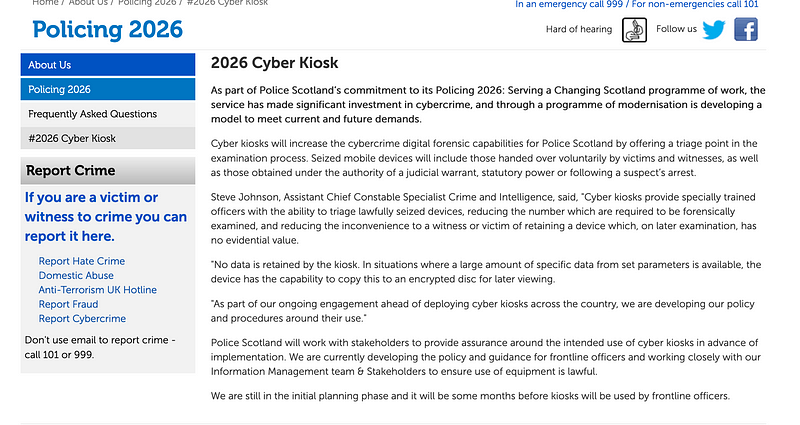Cyber Kiosks — The Data Harvesting Booth or Protecting Society?

Cyber Kiosks — The Data Harvesting Booth or Protecting Society?
I had just arrived in Kirkcaldy on Thursday for a meeting about “Crypto Toun” — yes, there may be plans to setup a Zug-style Crypto Village in Scotland — and I received a call from the STV:
“Could you comment on these new Cyber Kiosks?”,
“Well … “,
and I explained all about what I knew about them.
Personally I have known about these for a while, but there really hasn’t been much debate with citizens on whether they are worth it, and how they will be used. I also have no idea why they called them “Cyber Kiosk”, perhaps there’s a plan to serve you coffee while watch your phone being harvested:

The Cyber Kiosk plan is all part of Policing 2026, and a vision of the future of using data within investigations, where your phone could reveal most of your world [here]:

Personally I can see both sides of the argument here, but there has been virtually no debate on the topic. There are also so many technical issues that need to to be addressed, along with privacy issues. And, in the end, your data is … YOU, and someone examining your data is them probing into virtually every part of your world. Why can’t there be an external review of the proposed system?
What was good to see with the coverage on STV, is that the media really took the subject seriously, and that there was real interest in the rights to privacy. For most types of crime, data needs to be handled carefully, and protected and analysed by skilled professionals. Phones can be easily tampered with, and evidence changed, so it is important for them to be handled carefully. For high-risk areas, such as missing children and serious risk to life, we do need ways to investigate quickly.
Conclusions
Why does the public sector struggle so much in engaging citizens? We need to design our on-line of the future, and fully engage with the people it affects … our citizens.
The debate on this has only just started.
Please be part of the debate, and make sure that we create the right balance. With Google and Facebook becoming more open in using our data, we need all parts of our society to be open about their usage of our data.